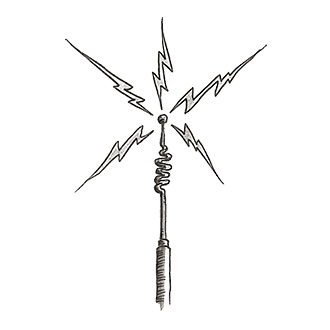
Related Questions
- Are cell phone conversations stored somewhere and are they retrievable?
- Will we ever run out of music?
- Can my Internet connection be “tapped” like a phone line?
- How does the Internet work?
- Can brain waves interfere with radio waves?
- Can we track the whereabouts of our dog using a passive microchip?
- Why don’t cell phones have retractable antennas anymore?
- Can portable electronic devices (like my phone) be recharged wirelessly?
- Could a GPS device reveal my location to others?
What is cloud computing?
It’s what happens on a network, and it’s not exactly new…
By Elizabeth EarleyFirst of all, cloud computing has nothing to do with clouds, says Srini Devadas, an Edwin Sibley Webster Professor of Electrical Engineering and a researcher in computer science in the Computer Science and Artificial Intelligence Laboratory. And second, the term “cloud computing” may have become a buzz phrase in recent years, but the technology behind it has been around for at least fifteen. One of the first major “cloud” milestones occurred in 1999 with the arrival of Salesforce, and the 2002 introduction of Amazon Web Services was the beginning of what has become a whole weather system of computing options.
“The simplest way to define cloud computing,” says Devadas, “is that it involves using a computer that is not on your desk.” Instead, you’re using a computing service powered by a cluster of hardware somewhere in the world and delivered to your terminal over the Internet.
When hundreds of thousands of servers are networked together (as in, when you have the Internet), these computers provide massive, shared capacity for computing that can be executed through software, storage, or infrastructure. People typically make use of the system through a particular service or application such as Gmail, DropBox, or Facebook. Very little of the data you see on the screen when you subscribe to these services is stored solely on your own computer, and software services like security, search, and storage are all handled within the systems themselves. “It came about because of economies of scale,” says Devadas. Centralized processing and storage “costs less than building and maintaining your own computing cluster, and it’s more scalable. You use more when you need more.”
You could think of each one of these systems as its own “little” cloud, but of course because they’re on the Internet, they can talk to each other, and sometimes they can even play nicely together — like when you use your Gmail or FB account to create an account at or sign on to a completely different website or service platform. “There is no such thing as a private cloud,” says Devadas. “Cloud computing is more general and elastic in terms of resources. It’s commoditized computing.”
Thanks to 17-year-old Ahmed Hamdy from Alexandria, Egypt, for this question.
Posted: September 24, 2013